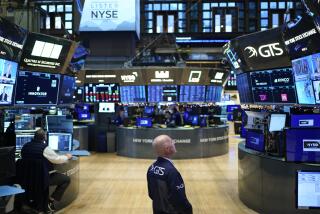More Companies, Funds May Take Hits From Derivatives
Many U.S. companies, pension funds and mutual funds may be exposed to losses similar to those suffered by Procter & Gamble Co. in the exotic market for so-called derivatives, financial analysts said Wednesday. Such losses could in turn affect the savings of millions of small investors.
Use of derivatives has grown sharply in the last few years, as they have been marketed to otherwise conservative institutional investors as a means of protecting against adverse changes in financial or commodity markets.
Today, pension funds holding foreign stocks use derivatives to limit their potential losses from currency fluctuations. Mutual funds have used them to put huge sums of money to work quickly without having to make sudden large purchases of stocks or bonds. And corporate treasurers use them to manage their costs of raw materials and credit.
But observers ranging from investment counselors to bankers are growing more alarmed that the increasing complexity of these instruments far outstrips the ability of corporate and investment managers to understand and control them.
âDerivatives do test the skills of portfolio managers in ways that are very new,â said William McBride, an analyst of international investments at Lipper Analytical Services.
Derivatives are financial instruments tied to, or âderivedâ from, conventional instruments or securities such as stocks, bonds or commodities. A futures contract on pork bellies, for example, is a derivative based on the price of raw bacon.
Procter & Gamble on Tuesday became the latest of a growing number of corporations to disclose losses from derivatives trading when it said it would take a $102-million after-tax charge to close out two swap contracts tied to movements in U.S. and German interest rates.
The swaps were evidently designed for Procter & Gamble by Bankers Trust Co. as bets that rates in both countries would fall; instead American rates shot up, and German rates have fallen more slowly than expected.
Investors are bracing for similar announcements from other companies that may have seen their exotic hedging strategies fail because of this yearâs extreme volatility in the financial markets. No adequate figures exist, however, on corporate Americaâs exposure to such risk.
Traditionally, derivatives have been only for the hardiest and most venturesome individual investors. In recent years, however, banks and investment houses have begun marketing them to institutional investors as hedges against the inherent risks in interest rate changes and other market moves.
For the most part, these programs have worked as intended. But the marketsâ recent volatility has made hedging strategies more difficult and costly to maintain. And some of the biggest losses have afflicted investors who changed from hedging to speculating.
And, to the extent that corporations or pension or mutual funds incur losses, so will their shareholders, beneficiaries and investors.
According to McBride, most stock mutual funds--including those aimed at conservative small investors--have rewritten their bylaws to allow them to trade derivatives, if only modestly. As pension funds have begun to diversify into overseas markets, they have found they need to hedge against the U.S. dollarâs strengthening in relation to foreign currencies--a trend that reduces the relative value of foreign securities.
The New Jersey division of investing, which manages that stateâs $35 billion in public pension funds, today has about 10% of its assets in foreign investments, and hedges 40% to 60% of that sum in the derivatives market against adverse currency moves, according to Roland Machold, its director. Many other public funds do the same.
One troublesome trend may be the one reflected in Procter & Gambleâs announcement: the trading of derivatives by corporations whose managers are not investment pros.
âThis is what happens when a chief financial officer turns himself into an investor and not just a manager of corporate cash flow and capital,â McBride said. âThese mistakes are somewhat the result of hubris.â
Bankers who lend to such companies are unnerved by the prospect that their corporate borrowersâ credit-worthiness may depend not on sales and profits, which they can measure, but on exotic trading that may be beyond the comprehension of even corporate managements.
âThe weakness that shows up again and again is in control structures,â said Terry Watson, head of trading credit administration at BankAmerica Corp. Indeed, Procter & Gamble Chairman Edwin L. Artzt said in a statement Tuesday that âderivatives like these are dangerous, and we were badly burned.â
More to Read
Inside the business of entertainment
The Wide Shot brings you news, analysis and insights on everything from streaming wars to production â and what it all means for the future.
You may occasionally receive promotional content from the Los Angeles Times.






